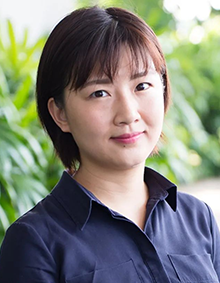17758013020 Chen Chen
-
-
-
17816169069 Jinglin Jian
-
17758013020 Chen Chen
17816169069 Jinglin Jian

Dr. Zhai Wei is an Assistant Professor in the Department of Mechanical Engineering at the National University of Singapore (NUS). She received her B.Eng. degree from the University of Science and Technology Beijing in 2011 and her Ph.D. degree from the University of Cambridge in 2015. She worked as a Research Scientist at the Singapore Institute of Manufacturing Technology, A*STAR, from 2015 to 2019. Her research group at NUS currently focuses on developing multiscale manufacturing technologies, such as additive manufacturing and freeze casting, for multifunctional materials, including soft materials, lattice structures, and composites. Since joining NUS in 2019, her team has published articles in top scientific journals, including Science Advances, Advanced Materials, Advanced Functional Materials, Acta Materialia, ACS Nano, Nano Letters, Small, Materials Horizons, etc.
Tough and Strong Hierarchical Soft Materials for Flexible Electronics
Wei Zhai*, Tian Li, Xinyu Dong, Xiao Guo, Haobo Qi
Department of Mechanical Engineering, National University of Singapore, 9 Engineering Drive 1, 117575, Singapore (mpezwei@nus.edu.sg)
Abstract
Conductive soft polymer gels have emerged as versatile materials for flexible electronics and soft robotics, owning to their great stretchability and sensing capability. However, most soft materials still encounter difficulties in meeting the demanding requirements of real-life applications due to the long-standing challenge of reproducing the excellent mechanical properties and multifunctionalities observed in natural soft tissues. Mammalian skin, for example, exhibits excellent tearing resistance and flexibility due to an intricate hierarchical structure of collagen fibers and fibrils. The hierarchical organization of tendons endows them with high strength and flexibility, allowing them to endure mechanical stress and execute contractions and relaxations. Inspired by the remarkable properties of bio-soft tissues, we have developed various multiscale manufacturing technologies to produce strong and tough conductive soft materials with hierarchical structures. This involves a freeze-casting solution substitution strategy 1-3, a facile combining strategy of self-assembly and stretch training 4, and a self-assembly-induced bridge cross-linking strategy 5. The strength of our materials has increased from 6.5 MPa, 20.78 MPa, and 54.8 MPa, while the toughness has also increased from 58.9 MJ/m3, 153.97 MJ/m3, to 260 MJ/m3, owning to multiple strengthening and toughening mechanisms at different scales. We have demonstrated the potential applications of our materials for monitoring sport behaviours in soccer training, non-contact speaking detection, and controlling artificial arms for grabbing objects, etc.
References
[1] Dong, Xinyu, Xiao Guo, Quyang Liu, Yijing Zhao, Haobo Qi, and Wei Zhai*. "Strong and Tough Conductive Organo‐Hydrogels via Freeze‐Casting Assisted Solution Substitution." Advanced Functional Materials 32, no. 31 (2022): 2203610.
[2] Guo, Xiao, Xinyu Dong, Guijin Zou, Huajian Gao*, and Wei Zhai*. "Strong and tough fibrous hydrogels reinforced by multiscale hierarchical structures with multimechanisms." Science Advances 9, no. 2 (2023): eadf7075.
[3] Dong, Xinyu, Xiao Guo, Quyang Liu, Haobo Qi, Guijin Zou, Tian Li, Huajian Gao*, and Wei Zhai*. "An organo-hydrogel with extreme mechanical performance and tolerance beyond skin. " Under Revision.
[4] Li, Tian, Haobo Qi, Xinyu Dong, Guanjin Li, and Wei Zha*i. "Highly Robust Conductive Organo‐hydrogels with Powerful Sensing Capabilities Under Large Mechanical Stress." Advanced Materials (2023): 2304145.
[5] Li, Tian, Haobo Qi, Yijing Zhao, Punit Kumar, Cancan Zhao, Zhenming Li, Xinyu Dong, Xiao Guo, Miao Zhao, Xinwei Li, Xudong Wang*, Robert O. Ritchie*, and Wei Zhai*. "Robust and Sensitive Conductive Nanocomposite Hydrogel with Bridge Crosslinking-Dominated Hierarchical Structural Design", Under Revision